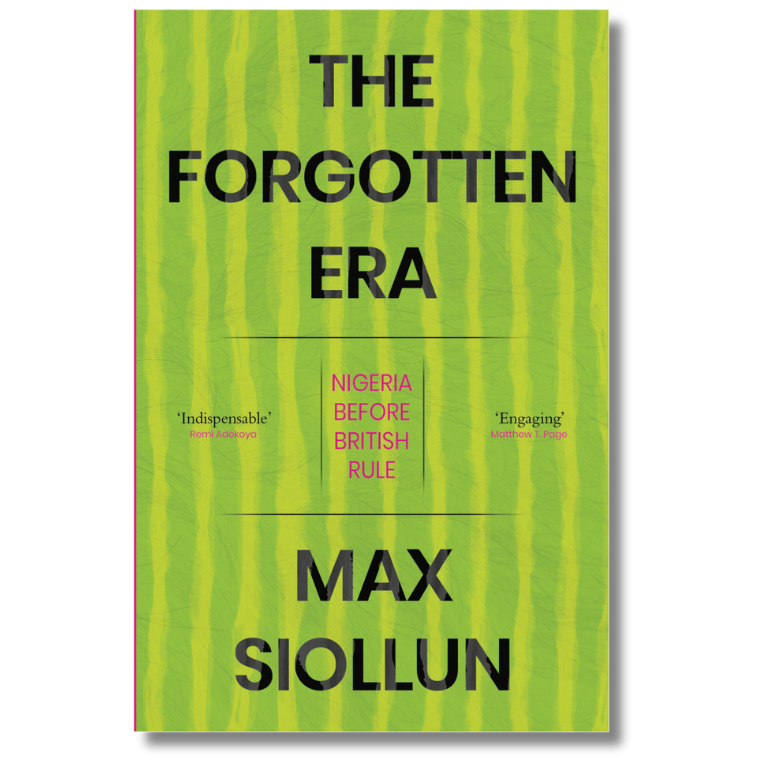Book Recs, Book Reviews
Review of The Forgotten Era by Max Siollun
As someone who has always been curious about Nigeria’s rich and layered history, reading The Forgotten Era felt like opening a door to a part of the past that often gets overlooked. Many of us were taught that Nigeria’s story begins with British colonization but this book proves that long before that, powerful kingdoms, powerful societies, and fascinating individuals shaped what would later become Nigeria.
Siollun takes us on a journey through Nigeria’s pre-colonial past, revealing a tapestry of sophisticated societies, powerful kingdoms, and influential figures. He challenges the misconception of pre-colonial Africa as a “dark continent,” instead presenting a notable landscape filled with innovation, governance, and culture.
What immediately makes this book special is the way it brings forgotten people and events back to life. Siollun doesn’t just write about empires and dates, he tells the stories of real people and the decisions they made. For instance, he tells the story of a family that overthrew three ancient kingdoms, showcasing the dynamic political landscape of the time. The Dan Fodio Family, gave most if not all the existing knowledge we know about the Sokoto Caliphate. The extent of their work can be found in the chapter “The First Family of Northern Nigeria”. He also introduces us to a royal court official who orchestrated the deaths of four kings, highlighting the complex power struggles within these societies.
He also dives into the story of the Oyo Empire. It’s not just a dry account of dates and rulers, he paints a vivid picture of how powerful and well-organized this kingdom was. The chapter explores how the Oyo people had a structured political system, with checks and balances that kept their leaders in line. It was honestly surprising to see how similar some of their systems were to modern governance.

It was really amazing to know how much influence the Oyo Empire had, not just in what is now southwestern Nigeria, but far beyond. Their army was strong, their trade was booming, and their cultural values were well respected. Reading about this made me realize that African history is so much more layered than I was ever taught in school.
Siollun also shows how this empire interacted with European traders before colonization really took off. You get a sense of how African kingdoms like Oyo weren’t just passive or waiting to be “discovered.” They were already thriving and making decisions that would impact their future for centuries.
It also encapsulates the story of a young slave boy— “Samuel Ajayi Crowther” who rose to become the first Black bishop in history (1864), eventually befriending Queen Victoria. It also tells us how it took Crowther 34 years before he successfully translated the bible to Yoruba. These factual stories not only help us see historical figures as real people but also demonstrate the interconnectedness of African and European histories. Proving that Africa had its whole system that was operational long before colonization.
Something that’s quite unique is his ability to present complex historical information in an engaging and accessible manner. With a clear and relatable writing style, making it easy for readers without a background in history to grasp the significance of the events and figures discussed.
His reports are enriched by vivid descriptions and well-researched details, bringing the past to life. He seamlessly weaves together various narratives, providing a comprehensive overview by focusing on Nigeria’s pre-colonial era, diverse regions and cultures before the lasting effects of colonization.
He emphasizes that understanding Nigeria’s history requires acknowledging the achievements and complexities of its pre-colonial societies. This perspective is terribly crucial for fostering a more significant appreciation of the country’s current cultural and political landscape.
I personally think this book should be a part of curriculums in schools (secondary and tertiary alike) as it really dissects us as a people, and shows us a part of ourselves that has been conveniently taken away from the history books. So, whether you’re a student, educator, or simply someone interested in African history, this book is a must-read. Max Siollun has given us a real gift with this work, a chance to see the richness and complexity of Nigeria before colonization, and a reminder that history is never as simple as it seems.
The Forgotten Era is a powerful reminder of the richness of Nigeria’s history before British rule. Max Siollun’s work not only fills a significant gap in historical literature but also inspires readers to explore and appreciate the diverse narratives that have shaped us.
About the Writer: Manuella Owukio is a storyteller at heart, whether she’s deep in a book or helping others shape their own. With a sharp editorial eye and a love for all things literary, she loves books filled with uncertainties and information that leave your mind blown for days on end. When she’s not knee deep in books, she writes articles and opinion notes on topics that matter to her.


